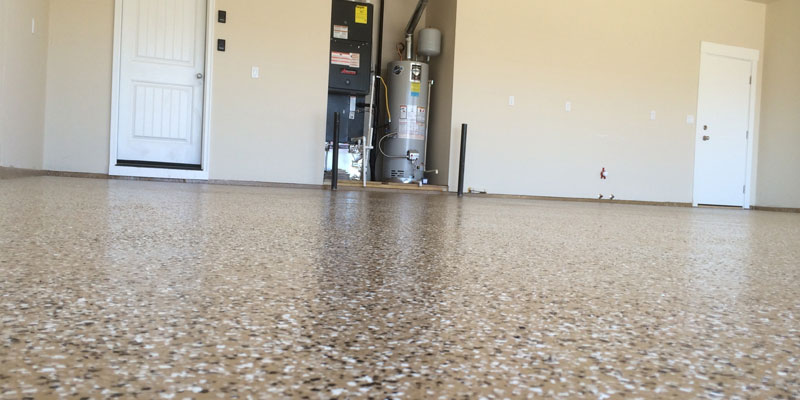Know About Epoxy Floor Coatings
Table of Contents
While there are countless different flooring materials on the market, epoxy flooring is one of the most durable and long-lasting options available. If you’re considering epoxy flooring for your home or business, it’s important to know everything there is to know about this type of coating. Here’s a comprehensive guide to everything you need to know about epoxy floor coatings.
What Is Epoxy?

Epoxy is a type of resin created by combining two separate compounds – a base and a curing agent. When these two compounds are mixed together, they create a hard, durable, and long-lasting material that can be used for various purposes. Epoxy flooring gets its name because this type of coating uses epoxy resin as its base.
What Is an Epoxy Floor Coating?

An epoxy floor coating is a type of flooring that uses epoxy resin as its base. This type of coating is typically applied to concrete floors in order to create a durable, long-lasting surface. Epoxy floor coatings can be used in both residential and commercial settings.
Where Are Epoxy Floors Installed?
Epoxy floors are most commonly installed in garages, basement floors, industrial facilities, commercial kitchens, and other high-traffic areas. This type of flooring is incredibly durable and can withstand heavy use without showing signs of wear and tear. You can find epoxy in areas like:
-Garages
-Basements
-Industrial facilities
-Commercial kitchens
-Auto showrooms
-Hospitality facilities
The Differences Between Residential, Commercial, and Industrial Epoxy
There are three different types of epoxy – residential, commercial, and industrial. Here’s a breakdown of each type:
Residential Epoxy: This type of epoxy is designed for use in homes. It’s typically thinner than commercial and industrial epoxy and doesn’t require as much prep work before it can be applied. Residential epoxy is available in a variety of colors and can be used to create various designs.
Commercial Epoxy: Commercial epoxy is thicker than residential epoxy and is designed for high-traffic areas. This type of epoxy is typically used in businesses, such as restaurants, retail stores, and office buildings. Commercial epoxy is available in a variety of colors and can be used to create various designs.
Industrial Epoxy: Industrial epoxy is the thickest type of epoxy and is designed for heavy-duty use. This type of epoxy is typically used in factories, warehouses, and other industrial facilities. Industrial epoxy is available in a variety of colors but is usually limited to solid colors.
The Benefits of Installing an Epoxy Floor
There are many benefits to installing an epoxy floor, including:
Increased Durability
One of the biggest benefits of epoxy flooring is that it’s incredibly durable. This type of flooring can withstand heavy use and traffic without showing signs of wear and tear. Epoxy floors are also resistant to stains, scratches, and fading.
Easy Maintenance
Another benefit of epoxy floors is that they’re easy to maintain. Unlike other types of flooring, epoxy floors don’t require special cleaners or treatments. You can simply sweep or mop your floor as you would any other type of floor.
Improved Safety
Epoxy floors are slip-resistant, making them a safe option for areas that may get wet or slippery. This type of flooring is also fire-resistant, which can help to improve safety in the event of a fire.
Increased Aesthetics
Epoxy floors are available in a variety of colors and designs, so you can create a floor that matches your style. This type of flooring can also be used to create logos or other designs.
The Importance of Professional Installation
Although epoxy floors are relatively easy to install, it’s important to have your floor installed by a professional. Professional installers have the experience and expertise necessary to ensure that your floor is installed correctly. DIY projects are risky and could result in damage to your floor or injuries.
Frequently Asked Questions About Epoxy Floors
Here are some frequently asked questions about epoxy floors:
How long does an epoxy floor last?
Epoxy floors are designed to last for many years. With proper care and maintenance, your epoxy floor should last for the life of your home or business.
How much does an epoxy floor cost?
The cost of an epoxy floor depends on a variety of factors, such as the size of your floor and the type of epoxy you choose. However, epoxy floors are generally more affordable than other types of flooring, such as hardwood or tile.
Is an epoxy floor right for me?
Epoxy floors are a good option for any home or business owner who is looking for a durable and easy-to-maintain floor. This type of flooring is also a good choice for anyone who wants to increase the aesthetic appeal of their space.
Can I customize my epoxy floor?
Yes! Epoxy floors are available in various colors and can be used to create various designs. You can also have logos or other designs added to your floor.
What are the disadvantages of epoxy floors?
The main disadvantage of epoxy floors is that they can be slippery when wet. However, this problem can be easily remedied by adding a slip-resistant additive to the epoxy. Additionally, epoxy floors may not be suitable for areas that experience extreme temperature changes, such as garages.
If you’re considering installing an epoxy floor, contact a professional installer to discuss your options.

